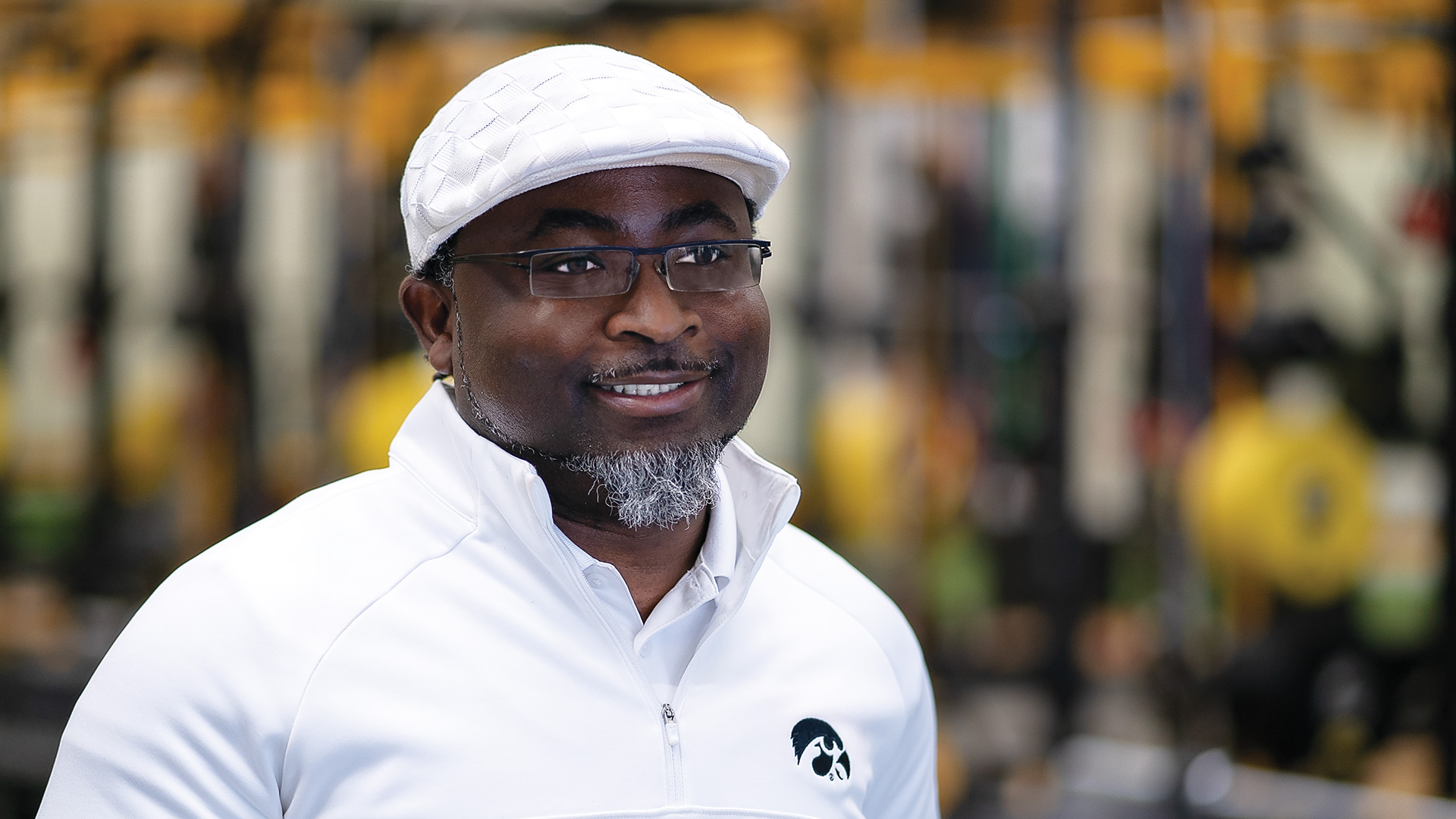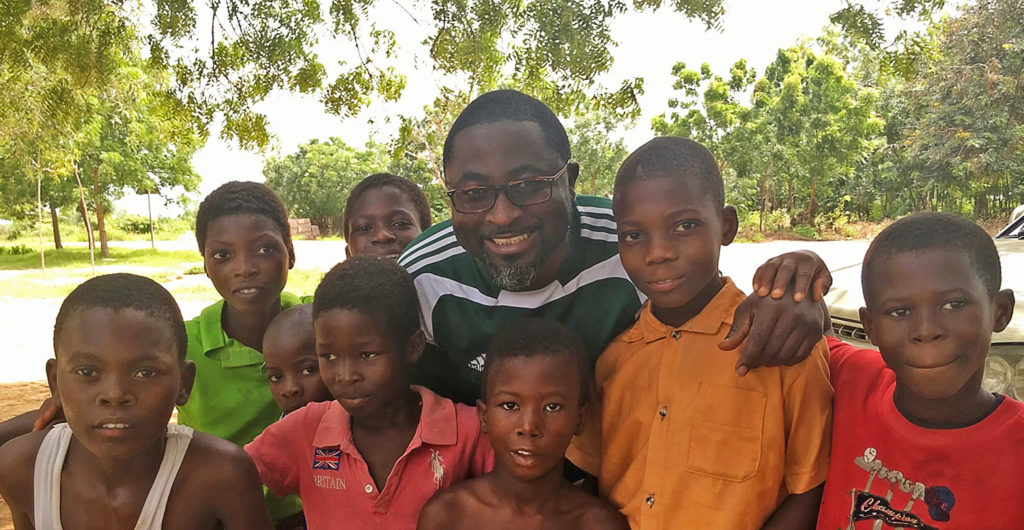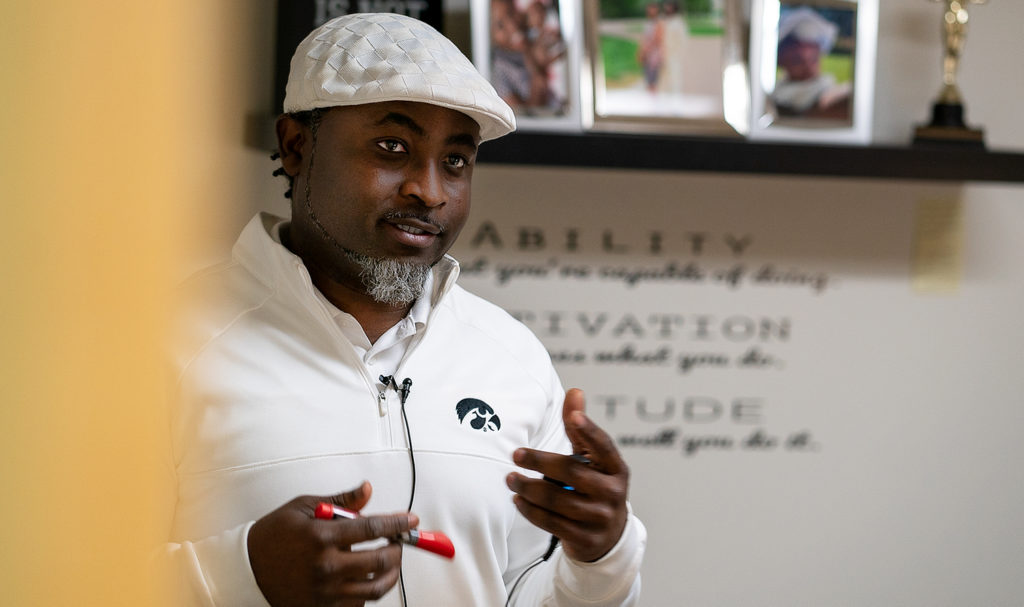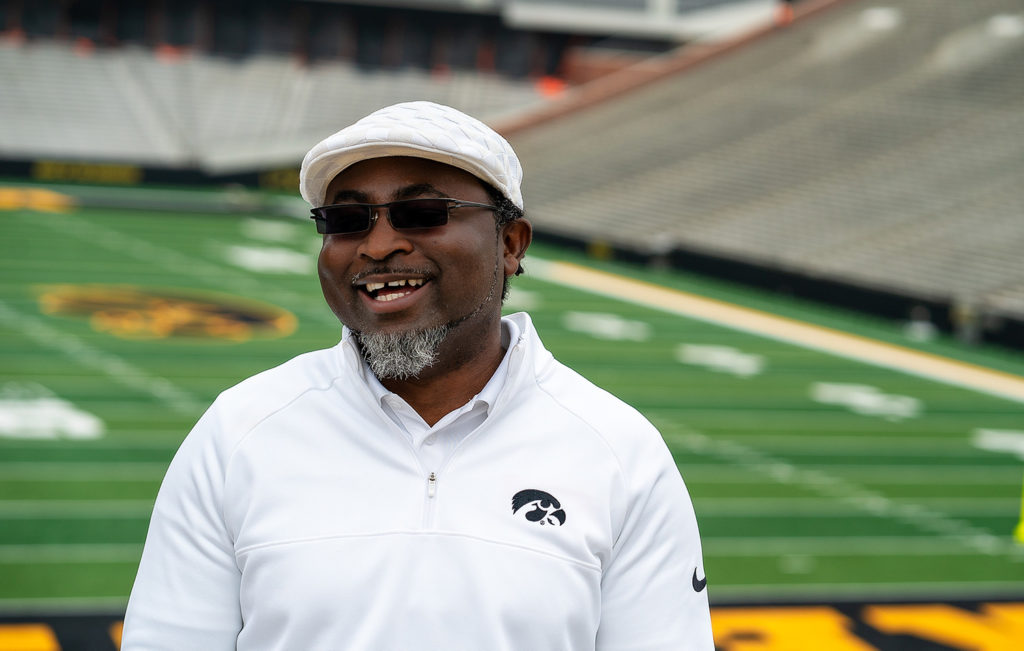
Eddie Etsey
Edudzi (Eddie) Etsey is the director of information technology at University of Iowa Athletics, where he provides leadership, strategic planning, and operational oversight for all of the university’s athletic programs. Born in Ghana, Eddie moved to Iowa City with his family in the early ’90s and studied computer science at the University of Iowa. His passion for bridging gaps between people and encouraging diversity of thought have not only helped him design more efficient programs but also strengthened his community.
You moved from Ghana to Iowa City in the 1990s. What was that experience like?
Yes, I moved from Ghana to the United States with my family in 1993. It was insanely crazy. I came from a societal culture, so it’s a community-based environment. The whole concept of a community raising a child is true in Ghana, but here not so much. The U.S. is an individual-based environment, and I didn’t understand that concept. And people didn’t understand the culture I came from, either. Coming from a place where everything you know is like-mindedness and everybody looks like you, to a system where there is a wide variety of individuals from different backgrounds and being a minority, it was weird.
That was also the year of the Great Flood of ’93. I saw people on boats in the streets, and I thought, “They do this in America?” It took a while to adjust and for people to get used to the way I spoke due to my Ghanaian accent. And I faced the stereotypes of people asking if I spoke English, did I have pet lions, did I sleep in trees . . . and so on.
How did those experiences shape who you became as an adult?
It helped me bridge differences. Now, I feel like I’m a liaison between two worlds: the American culture, and the outside of American culture — because American culture is so different from anywhere else.
Now I work a lot with international students and families bridging those gaps. I actually have a nonprofit organization called Eddies Teddies Inc., that takes individuals to Ghana for two weeks and immerses them in the culture. They do things like teach at schools, work with little kids, really understand what it means for someone to be from a different country.

That’s really what my nonprofit is all about — bridging gaps and creating global space where people feel comfortable to be themselves and to talk.
I’ve also done some classes that talk about what it means to be global in Iowa. There’s a lot of work that goes into just getting to the United States. Then, once you’re here, you have to find a place to live, figure out how to get a haircut — things that people from here take for granted.
A lot of people don’t understand what it’s like for someone to leave a place where they’re the majority and come here, where everyone is different. You might have a group of friends, but you can feel lonely because there are some things that you really want that you can’t get anymore. Maybe something like a type of bread that they have back home that you can’t get here.
So, my main purpose now is to serve those individuals, help them acclimate to the new environment and make sure they find good support systems. I want to help high school kids understand people coming from the African continent. And I want people coming from the African continent to get what they need here. That’s really what my nonprofit is all about — bridging gaps and creating global space where people feel comfortable to be themselves and to talk.
Can you tell us about your educational background?
When I first got here, I was very excited because it’s America, it’s the land of opportunities. I wanted to do great things.
I remember in my junior year talking to my guidance counselor about college options. He said I was wasting my time, because when I transferred here from Ghana I was put into the basic track of high school, the one that’s for individuals who just go through the motions to get a high school diploma. My guidance counselor said that I wouldn’t get admitted into any four-year colleges or universities and that I should look at technical schools. That shattered my world. I had over 3.0 GPA and thought I was a good student. But the way the system was set up, I didn’t have any classes that were actually preparing me for the future.
The following day, my mom went to the school and said, “I don’t care what it takes; we are putting him in at least the standard track.” I didn’t do very well in my junior year, but it helped me step into what it would take to get into college.
The great thing is that I was pretty athletic — I played soccer and was good enough to get a scholarship. But I turned it down because my mom said something that stuck with me. She said, “You can fix a broken bone, but you can’t fix a broken mind.” We decided that I was going to put my education first.
I applied to the University of Iowa, where both my parents were students at the time. (They later would go on to earn their PhDs.) I was accepted on a probation basis, meaning that within the first year I had to get at least a 2.0 GPA before they would admit me fully. I don’t know what I was thinking, but I decided to major in computer science. It was really hard. All the things they were talking about in class, I was never prepared for. It was like starting college without ever going to high school.
With my support system, I was blessed enough to make it and then I did a math degree on top of that. I finished both degrees and really wanted to go back to West High and tell my guidance counselor that I’d made it.

What got you interested in pursuing technology as a career?
Well, my dad wanted me to be a bank manager. He’s a stats guru, and math has always come easy for me. But I wanted to do something besides look at numbers all day. My junior year of high school, I went out and bought my own used computer, and I started messing around with that, taking it apart, rebuilding it. I thought that’s what I was going to learn in computer science, but it wasn’t. I did learn a lot of programming languages, though, so I kind of married the programming and technical aspects and that made me who I am today.
What were your responsibilities at University of Iowa (UI) Hospitals & Clinics?
After I graduated in 2003, I got a job at UI Hospitals as a communication technology specialist. I was the hospital operator. From there, I went into being the help desk agent. That was around the time they were trying to create a help desk for the Carver College of Medicine and UI Hospitals. From there, I became the help desk supervisor, and then the service delivery manager.
It was at this point that I finished my master’s in informatics, specializing in health informatics, looking at nanotechnologies and how they can help cancer patients. Even though I didn’t do much with my nanotechnology research and interest at UI Hospitals, it helped me rethink and look at some IT processes differently. I was transitioned into process improvement manager role, and from there became the service delivery, IT facilities & infrastructure manager, overseeing daily operations of all IT facilities including data centers, telecom rooms and specializing in disasterrecovery and business continuity initiatives.
I was also initially tasked with helping the hospital implement IT Service Management using Information Technology Infrastructure Library (ITIL) framework, so I got a lot of education in IT services management. I really got into what it means for IT organizations to bring value to an institution. I always enjoyed helping develop, reshape and improve processes to bring value.
In the fall of 2017, you became the director of UI Athletics Information Technology. What all goes into running Hawk IT?
Anything from the daily operations, like computers not working, to game-day preparedness and operations for all sports. And being the guy who thinks about what technology’s going to look like five years from now, how it will affect the sports & entertainment business and how to leverage the changes to empower UI Athletics. My role is to provide leadership and strategic planning.
When I got here, I thought, this is a great challenge for me, because I can build a team that can take athletics to the next level. I’m always thinking, What does the next level look like? What does Kinnick Stadium and Carver Hawkeye Arena look like five years from now? One of the most fun projects I’m looking at right now providing ability to prepay for parking before game days and self-service for concession stands. Having the ability to order food from your seats. Basically, using technology to give fans the experience they can get when they are sitting at home, but while they’re watching the game here.
My vision for Hawk IT is to empower coaches to win, to equip students to graduate, and to do it right, with integrity. I can empower coaches to win, by removing the fear of technology, helping them make data driven decisions, providing what they need and most importantly, improving IT processes. This includes making sure my team is available when needed both here and on the road. As far as tech is concerned, if they’re afraid of it, I need to remove that fear factor for them to feel comfortable to do their work. That’s really what I’m here for.

My vision for Hawk IT is to empower coaches to win, to equip students to graduate, and to do it right, with integrity.
This year’s Catalyst series focuses on underrepresented groups in technology. Why is it important to have people of different backgrounds in technology?
I’m going to take it a step further and say that we don’t just need diversity — we need diversity, equity and inclusion. That’s a holistic view of what we should be doing. I say that because we can go ahead a hire a minority, and we have the physical diversity, great. But what are we doing to make sure she stays here? What are we doing to make sure she feels at home? Are we empowering her to do her work? Is she working with diversity of thought, or is she narrowly focused on what her background is?
The most important part about diversity, equity and inclusion is the idea of diversity of thought, not just the diversity of people. Diversity of thought asks, What are we trying to get out of all these diverse ideas, and how can we move forward with one great idea? Your implicit biases might cloud your judgment in how you see someone else, but that should not cloud your judgment in how you take in the information they are providing to you. Because those aren’t experiences that you’ve lived; that’s not the background you are from. So you accept and marry that with your own ideas, and that’s how you grow.
New experiences are how you learn. Make sure you get out of your comfort zone, and include people, and understand that everyone is different. The world is not about everyone being the same; it’s about accepting people from different backgrounds and figuring out how to challenge each other by bringing up good ideas.
What advice do you have for a young person considering entering tech?
Have a focus. The biggest thing within tech right now is that it’s so massive. There are millions of jobs out there; you need to have an idea of what it is you want to do.
I am always challenging my interns and staff with this question, “what do you want to do?” and “I don’t know” is not an option. Write down the top three jobs you think you’d be good at, and ask yourself if you have the characteristics, the attributes, the personality to be in those roles. If you do, what can you do education wise or experience wise to get there? What classes can you take? Maybe you can get an internship. Don’t be afraid to reach out to people and say, “Hey, I want to know more about your job. What’s your day look like? Can I come and spend a day with you?”
If you don’t know what you want to do in tech, I’d advise looking into IT service management. (ITSM) because it’s something you can relate to in all fields — it’s not a cookie-cutter methodology. If you’re a programmer or an IT director or a help desk agent, ITSM is a tool you can use to understand what users want, how you can help them, and how you can bring value to the organization. It’s something people don’t spend enough time on.
Tell us more about your philanthropic work.
I love being involved in the community both locally and internationally. Right now, I serve on the board of directors for CommUnity Crisis Services and Food Bank, (formerly the Crisis Center). Working with low-income individuals is a passion of mine. Really, just any individuals in the community who need help. I’ve worked with Goodwill and coached people with disabilities. That is really something that grounds me. At the end of the day, nothing else matters but helping each other.
I also work with young adults from junior high age being a support system for them. As the president of Eddies Teddies Inc, a nonprofit I started to help the underprivileged children and to create awareness, I also get a chance to work on really cool projects across the globe. We’re going to Ghana in June to build a computer lap and teach classes, and next year we’re building playgrounds and elementary schools. Then the next year, we’re going to Brazil. It’s really about getting there and helping people. That’s what makes me happy.
Outside of tech and charity work, what are you passionate about?
God and family. I am a big family guy. I am a big believer in the love family gives. My family is what got me where I am today. I’m also passionate about the community as I mentioned before, and just getting out and helping people. I love cooking, playing outdoor sports like beach volleyball and soccer, and I love traveling.
What impact do you want to leave on Iowa’s tech community?
I hope everybody would know that I am open to collaborating with anyone. Because I function in the diversity of a thought, I believe that the more you collaborate, the better the world becomes. I want people to think that I was really good at collaborating, welcoming people, making people feel that technology is not that scary, that change is actually a good thing. Just making sure the fear of tech and how people see tech as this unknown world is removed so people feel comfortable with it.
“The most important part about diversity, equity and inclusion is the idea of diversity of thought, not just the diversity of people.

